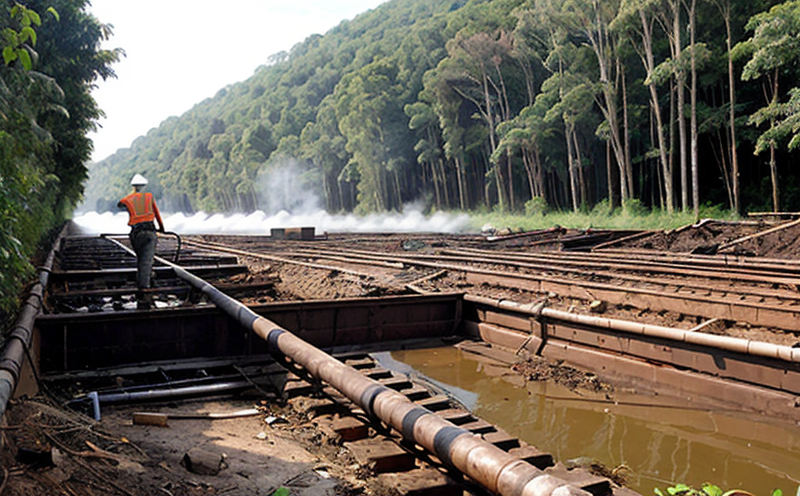EN 16214 Biofuels Sustainability and Compliance Risk Audit Test
The EN 16214 standard is a European framework designed to assess the sustainability of biofuels. This test evaluates whether biofuels meet specific criteria that ensure they are produced in an environmentally responsible manner, with minimal impact on biodiversity and ecosystems. Compliance with this regulation helps businesses align their operations with EU environmental policies.
The audit aims at identifying risks related to compliance with the sustainability criteria laid out in EN 16214. This includes verifying that biofuel production adheres to defined sustainability indicators such as land use change, greenhouse gas emissions, and water consumption. By conducting this test, organizations can ensure they are not only compliant but also contribute positively to environmental preservation.
The audit process involves several steps: initial documentation review, field visits to production sites, laboratory analysis of samples, and a detailed report summarizing all findings. During the audit, experts will check if biofuel producers meet the requirements set forth by EN 16214 regarding land use management practices, energy efficiency measures, and waste treatment processes.
One key aspect of this service is its role in mitigating risks associated with non-compliance. For instance, if a company fails to comply with certain regulations, it could face severe penalties or even be forced out of business due to legal action taken by regulatory bodies. By performing regular audits like those mandated by EN 16214, companies can proactively address potential issues before they become critical problems.
In addition to reducing risk exposure, these audits also provide valuable insights into how well a company is meeting its sustainability goals. They offer an opportunity for continuous improvement in terms of operational efficiency and environmental stewardship. Furthermore, successful completion of such audits can enhance reputation among stakeholders who value corporate social responsibility (CSR) initiatives.
It's worth noting that this service goes beyond mere compliance; it encourages proactive approaches towards sustainable development within the biofuel industry. Through rigorous testing procedures based on internationally recognized standards, Eurolab ensures accurate evaluation of each client’s operations against established benchmarks.
- Evaluation of land use changes associated with biofuel production
- Assessment of greenhouse gas emissions during processing stages
- Analysis of water usage throughout the supply chain
- Verification of compliance with EU directives on renewable energy sources
EuroLab Advantages
At EuroLab, we pride ourselves on delivering top-tier environmental testing services that go above and beyond industry expectations. Our team of experienced professionals brings decades of combined expertise to every project, ensuring accurate results and reliable advice for our clients.
We understand the importance of staying current with evolving regulations like EN 16214, which is why we invest heavily in state-of-the-art laboratories equipped with cutting-edge technology. This allows us to conduct precise analyses that meet or exceed global standards. Whether you need help navigating complex compliance issues or simply want peace of mind knowing your operations are sustainable and responsible, EuroLab has the tools and knowledge necessary to support your needs.
Our commitment to excellence extends beyond just technical proficiency; we also prioritize excellent customer service throughout every stage of our collaboration with clients. From initial consultation through final reporting stages, communication remains open and transparent so that you always know what’s happening next in your project timeline. Additionally, our dedicated account managers work closely with each client to ensure their unique requirements are addressed efficiently.
Choosing EuroLab means choosing a partner who understands the challenges faced by biofuel producers today while being committed to helping them overcome those obstacles effectively and sustainably. With us by your side, you can rest assured that your business practices will remain compliant with relevant laws and regulations, thereby protecting both current operations and future growth prospects.
Environmental and Sustainability Contributions
- Evaluating the environmental impact of biofuel production processes
- Identifying areas where improvements can lead to reduced carbon footprints
- Promoting responsible sourcing practices for raw materials used in biofuels
- Encouraging recycling and waste reduction strategies within manufacturing facilities
Competitive Advantage and Market Impact
In today’s competitive market, being able to demonstrate compliance with international standards is crucial for maintaining a strong position. For biofuel producers, meeting the requirements outlined in EN 16214 not only enhances credibility but also opens up new opportunities for business expansion.
Companies that implement sustainable practices early on tend to enjoy higher customer loyalty and greater market share compared to those who do not. By showing commitment to environmental protection through rigorous auditing processes, businesses can attract environmentally conscious consumers who value these values highly. This can translate into increased sales volumes and long-term profitability.
Moreover, compliance with EN 16214 helps protect companies from potential legal actions brought forth by authorities responsible for enforcing such regulations. Non-compliance often leads to hefty fines or even closure of plants, which could severely damage a company’s reputation and financial stability. On the other hand, proactive measures taken during audits can prevent costly mistakes down the line.
Lastly, participating in sustainability initiatives like those required by EN 16214 allows companies to position themselves as leaders within their industry sector. This positions them favorably among competitors and contributes positively towards overall market competitiveness.





